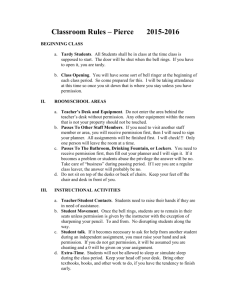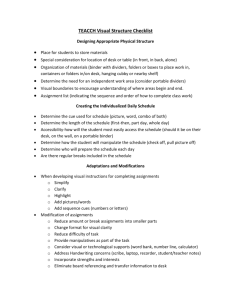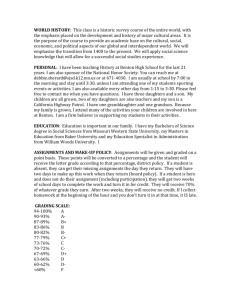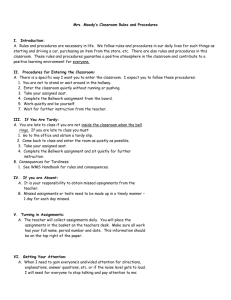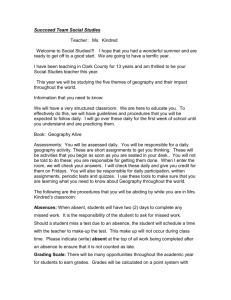Sophomore English
advertisement
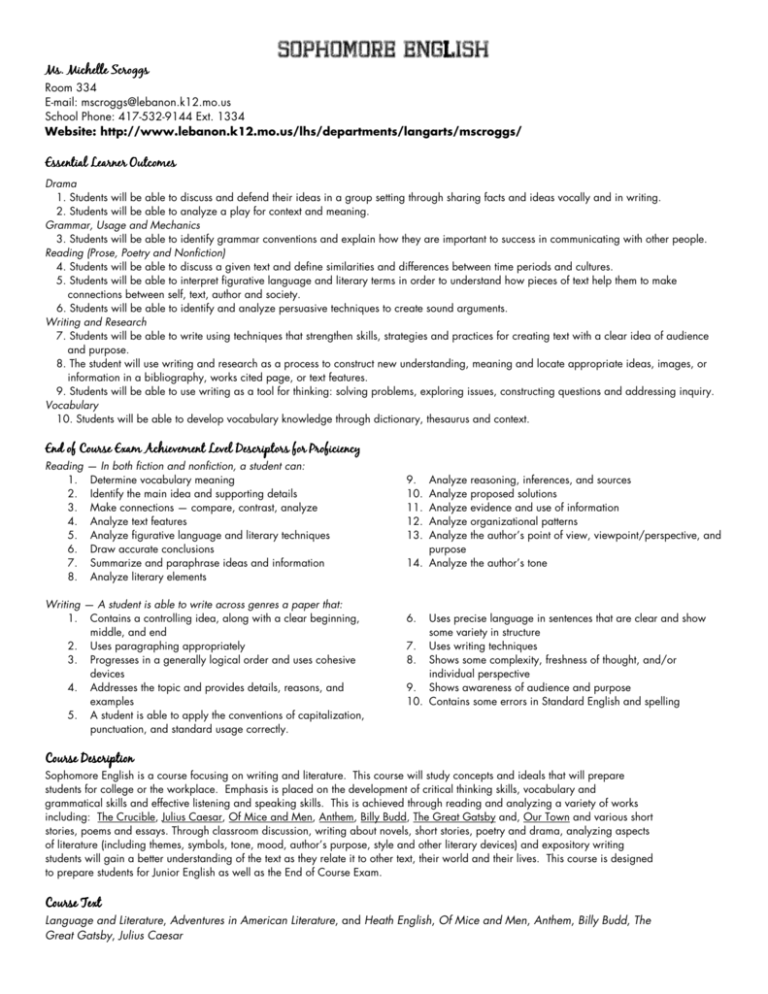
Ms. Michelle Scroggs Sophomore English Room 334 E-mail: mscroggs@lebanon.k12.mo.us School Phone: 417-532-9144 Ext. 1334 Website: http://www.lebanon.k12.mo.us/lhs/departments/langarts/mscroggs/ Essential Learner Outcomes Drama 1. Students will be able to discuss and defend their ideas in a group setting through sharing facts and ideas vocally and in writing. 2. Students will be able to analyze a play for context and meaning. Grammar, Usage and Mechanics 3. Students will be able to identify grammar conventions and explain how they are important to success in communicating with other people. Reading (Prose, Poetry and Nonfiction) 4. Students will be able to discuss a given text and define similarities and differences between time periods and cultures. 5. Students will be able to interpret figurative language and literary terms in order to understand how pieces of text help them to make connections between self, text, author and society. 6. Students will be able to identify and analyze persuasive techniques to create sound arguments. Writing and Research 7. Students will be able to write using techniques that strengthen skills, strategies and practices for creating text with a clear idea of audience and purpose. 8. The student will use writing and research as a process to construct new understanding, meaning and locate appropriate ideas, images, or information in a bibliography, works cited page, or text features. 9. Students will be able to use writing as a tool for thinking: solving problems, exploring issues, constructing questions and addressing inquiry. Vocabulary 10. Students will be able to develop vocabulary knowledge through dictionary, thesaurus and context. End of Course Exam Achievement Level Descriptors for Proficiency Reading 1. 2. 3. 4. 5. 6. 7. 8. — In both fiction and nonfiction, a student can: Determine vocabulary meaning Identify the main idea and supporting details Make connections — compare, contrast, analyze Analyze text features Analyze figurative language and literary techniques Draw accurate conclusions Summarize and paraphrase ideas and information Analyze literary elements Writing — A student is able to write across genres a paper that: 1. Contains a controlling idea, along with a clear beginning, middle, and end 2. Uses paragraphing appropriately 3. Progresses in a generally logical order and uses cohesive devices 4. Addresses the topic and provides details, reasons, and examples 5. A student is able to apply the conventions of capitalization, punctuation, and standard usage correctly. 9. 10. 11. 12. 13. Analyze Analyze Analyze Analyze Analyze purpose 14. Analyze reasoning, inferences, and sources proposed solutions evidence and use of information organizational patterns the author’s point of view, viewpoint/perspective, and the author’s tone 6. Uses precise language in sentences that are clear and show some variety in structure 7. Uses writing techniques 8. Shows some complexity, freshness of thought, and/or individual perspective 9. Shows awareness of audience and purpose 10. Contains some errors in Standard English and spelling Course Description Description Sophomore English is a course focusing on writing and literature. This course will study concepts and ideals that will prepare students for college or the workplace. Emphasis is placed on the development of critical thinking skills, vocabulary and grammatical skills and effective listening and speaking skills. This is achieved through reading and analyzing a variety of works including: The Crucible, Julius Caesar, Of Mice and Men, Anthem, Billy Budd, The Great Gatsby and, Our Town and various short stories, poems and essays. Through classroom discussion, writing about novels, short stories, poetry and drama, analyzing aspects of literature (including themes, symbols, tone, mood, author’s purpose, style and other literary devices) and expository writing students will gain a better understanding of the text as they relate it to other text, their world and their lives. This course is designed to prepare students for Junior English as well as the End of Course Exam. Course Text Language and Literature, Adventures in American Literature, and Heath English, Of Mice and Men, Anthem, Billy Budd, The Great Gatsby, Julius Caesar Sophomore English School Year AtAt-a-Glance 1st Semester 2nd Semester August January Introduction to Expository Writing Descriptive/Narrative Essay Our Town Unit September Billy Budd Unit 3rd Quarter Common Assessment Introduction to the American Dream Of Mice and Men Unit February March October The Great Gatsby Unit The Crucible Unit 1st Quarter Common Assessment April November Short Story Unit 6 short stories, 24 vocabulary words, 13 Literary terms December Anthem Character Analysis 1st Semester Final 2nd Quarter Common Assessment Of Note Vocabulary in each unit Julius Caesar Unit Grammar Review May Julius Caesar Projects/Presentations Grammar Final End of Course Exam 4th Quarter Common Assessment Of Note Grammar Mondays Parts of Speech; Parts of a Sentence Class Attendance If you miss class, you are responsible for getting handouts and missed work from the Make-Up Work folders in the crate or at the class website listed at the top of the syllabus. BQs will be taped to the front of the crate. The calendar will be posted above the crate at all times. You should always check the calendar and crate before asking me what you missed. Any notes taken in class will need to be gotten from a friend. Study buddies are highly recommended! Make-up work is due one class session after you return to class. If you miss a quiz or test, you will be given two (2) days to make it up. It is YOUR responsibility to schedule a make-up test before or after school or during advisory. If you know of a planned absence due to a school function, you should notify me in advance and turn in any work that will be due on that day. Homework and Late Work Each day you come to class there will be a Board Question (BQ) on the board for you to begin as soon as you enter class. You should be working when the bell rings and continue to work until you are prompted to stop. Each BQ should be written in your BQ notebook (provided by me) unless otherwise instructed. It should include an MLA heading, the question or prompt, and your response. BQs are worth 10 points each unless otherwise stated. Again, BQs will be taped to the front of the crate in case you missed class. We will also be taking notes and doing class work during each class period. Any notes that you missed, as stated above, will need to be gotten from a classmate. All handouts and assignments can be found in the Make-Up Work crate. Again, make-up work is due one class session after you return to class. HOT Sheets: All students are expected to complete and turn in every assignment. If you do not, you will be required to participate in the HOT sheet program designed to assist you with this issue. In the event that you do not turn in an assignment, you will be required to fill out a HOT sheet documenting the missing assignment. Late penalties will apply. Note: Some assignments may not be taken late. This especially applies to rough drafts and any process points given during a writing project. All major papers and projects are due on the assigned day. Attendance on due dates is a priority. Because of the length of time given for major papers, there should be no excuses for a late paper. For example, if we work four weeks on a project, I expect the paper to be turned in the day it is due. If you cannot be at school that day, please have your paper delivered. In desperate situations you can e-mail your paper to me as an attachment to prove that you are finished and then deliver a hard copy to me when you return. If you do not attend class and do not turn in the paper on the day it is due, late penalties will still apply. Also, all extra credit opportunities may be eliminated if you do not meet these major deadlines. If you have a problem, you should meet with the teacher before the assignment due date in order to make any necessary adjustments. A responsible student who isn’t procrastinating will troubleshoot long before it becomes a last night or last minute disaster. Waiting until the night before is procrastinating, not responsible troubleshooting. Final Note: If there is a life emergency or tragedy, we will make adjustments as needed. Late Penalties: Daily assignments that are given hot sheets will be penalized 50%. Late papers or major assignments will be penalized a minimum of 25% for each calendar day the assignment is late. Again, some assignments may not be taken after a certain cut off date. The nature of the assignment will determine that final cut off date. Grading Policy and Scale Letter grades will be assigned according to the following standard scale: 100-95 A 3.68-4.00 94-90 A3.33-3.67 89-87 B+ 3.00-3.32 86-83 B2.67-2.99 82-80 B 2.33-2.66 79-77 C+ 2.01-2.32 73-76 72-70 69-67 66-63 62-60 59-0 C CD+ D DF 1.68-2.00 1.34-1.67 1.01-1.33 0.68-1.00 0.67-.099 0.00-0.66 Grading Formula: Formula: Tests, quizzes, projects, and papers 45% Class work, homework, participation 40% Semester Final 15% Cell Phone/iPod/mp3 Players Cell phones are never to be out in class. I will have a cell phone basket where you are encouraged to leave your cell phone at the beginning of class. It will be returned to you when class is over at no penalty. However, if you do not put it in the basket and I see it, I will take it away. On your first offense, you may pick it up after school. On the second offense and any after, your cell phone will be given to the office and you will be written a referral for insubordination. iPods and mp3 players may be used in class during quiet work/reading time. You may not use it during instruction or during tests and quizzes. Having these or cell phones out during tests or quizzes is considered cheating and will result in a “0” for that assessment. Portfolio You should have a 3-ring binder specifically for this class at least 1” thick with 5 tabs. I will review and grade the contents of your portfolio every few weeks, so be sure to keep it up! The five tabs are: 1. Syllabus and Calendars 2. Vocabulary 3. Notes 4. Handouts 5. Class work Classroom Expectations and Rules 1. Entering the classroom: 2. 3. 4. 5. a. You should enter the classroom and sit in your assigned seat. b. Place your bags under the desk as best you can. Purses and bags may not be placed on the desk. c. Place your cell phone in the basket to ensure that you don’t use it during class! ☺ d. There will be a Board Question (BQ) on the board each day for you to begin as soon as you enter class. Working together: a. You will work in pairs or groups sometimes during class. Groups will often be chosen by me. b. You are expected to work together quietly and diligently. I should NEVER be able to hear your voice across the room! Class Discussions a. You should raise your hand to speak in class unless told otherwise. b. You should not talk when the teacher or another classmate is talking. Turning in work/Getting work back: a. You should turn all class work into the designated area each day. b. When you get work back, you should place it in your English binder so you will have it for portfolio checks. Ending/Leaving the classroom: a. You should not begin putting your things away before the bell rings. b. Make sure you put all desks, books, and materials away neatly and where they belong. c. You will be dismissed by the teacher, not the bell! Supplies: Each student will need the following supplies for class: Three-ring binder (1 inch or larger) with tab dividers (at least 5) Pencils and/or pens (blue/black only; others will not be accepted) Notebook Paper If you are unable to purchase these supplies, please come talk to me and I will make sure they are made available to you. I’m excited to be teaching you for the 2010-2011 school year! If you have any questions or concerns about our class, please email me or set up a time to come and talk to me. ☺ Be… Safe Responsible Come to the teacher’s desk only to ask questions. Respectful Respect the space of the teacher and your classmates. Do not take/use items on the desk without permission. a Learner Only come to my desk to ask questions Teacher’’s Desk No students behind or in teacher’s desk. Students’’ Desks Keep all desk legs on the floor and do not move desks unless directed. Use the desk for learning Do not deface students by only. They are not for sitting writing on them, sticking or standing on! gum, under them, etc. Classroom Materials Do not throw materials or use them in inappropriate ways If materials are borrowed please return them to their original location. Student Materials Do not throw materials or use them in inappropriate ways Always have supplies ready Ask before you borrow for use and in class…Be things from others. prepared! Use supplies for learning purposes only and not for personal use Entering and Exiting (Passing Time) Go directly to your seat when you enter the room and do not leave until you are dismissed by the teacher. Bring all things to class and be working on board questions when you enter the room Be in class on time and prepared. Check the agenda. Begin BQs immediately. Dismissal Bell Do not run when the bell rings to be dismissed Make sure you take all your Make sure you have written belongings with you, but do Do not leave until dismissed down your assignments not pack up until the bell by the teacher before you leave. has rung. Asking for Help Make sure you read the Stay in your seat, raise your directions before asking hand and wait patiently questions. Listen to others’ questions. Cell Phones, iPods/Mp3 players Keep cell phones in a safe place that is not visible while in class. You may not use cell phones during class time. iPods may be used while doing individual work. Keep cell phones on silent and put them in the basket. Let your parents know that they can call the school if there is an emergency Quiet Time (Independent Seat Work) Stay in your seat and keep hands and feet to yourself Use your time wisely to work on the assignment given. Work from other classes may be worked on after your assignments for English are finished. Keep to yourself so that everyone has the same chance to complete the work. Stay on task, be productive and ask questions Activity Time/Group Work Keep hands and feet to yourself and remain seated Complete the given task and stay on task Keep voices low and only work on the activity your are assigned Be productive, reflect on what you have learned and complete all parts of the activity Hall Passes (Bathroom, Go directly to the location Water Fountain, Office, you for which you were given permission to go. Advisory) Homework/Make-up Work Stay focused and do your own work. Use supplies for learning Make sure supplies are purposes only and not for returned in good condition. personal use Leave the classroom in the same shape (clean, organized, etc) in which you found it. Always ask Stay in your seat, raise your questions…never be afraid hand and wait patiently to ask anything! Be sure to sign out. Complete what needs to be Do not disrupt others when completed and return to traveling during class time class immediately. Stay on task and make sure to complete your assignments. If you miss class, be sure to get your assignments from the crate or the website. The desk is there for you to use when doing work, studying or participating in group projects. Do your business between classes. Turn in all assignments on time. If you are absent, you Do your own work and have one class period after keep your portfolio organized. you return to turn in the missed work.
